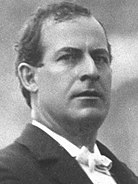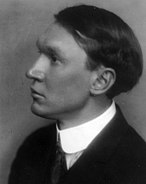
William McKinley was an American politician who served as the 25th president of the United States from 1897 until his assassination in 1901. A member of the Republican Party, he led a realignment that made Republicans largely dominant in the industrial states and nationwide for decades. He presided over victory in the Spanish–American War of 1898; gained control of Hawaii, Puerto Rico, the Philippines and Cuba; restored prosperity after a deep depression; rejected the inflationary monetary policy of free silver, keeping the nation on the gold standard; and raised protective tariffs.

The Cross of Gold speech was delivered by William Jennings Bryan, a former United States Representative from Nebraska, at the Democratic National Convention in Chicago on July 9, 1896. In his address, Bryan supported "free silver", which he believed would bring the nation prosperity. He decried the gold standard, concluding the speech, "you shall not crucify mankind upon a cross of gold". Bryan's address helped catapult him to the Democratic Party's presidential nomination and is considered one of the greatest political speeches in American history.

The 1896 United States presidential election was the 28th quadrennial presidential election, held on Tuesday, November 3, 1896. Former Governor William McKinley, the Republican nominee, defeated former Representative William Jennings Bryan, the Democratic nominee. The 1896 campaign, which took place during an economic depression known as the Panic of 1893, was a political realignment that ended the old Third Party System and began the Fourth Party System.
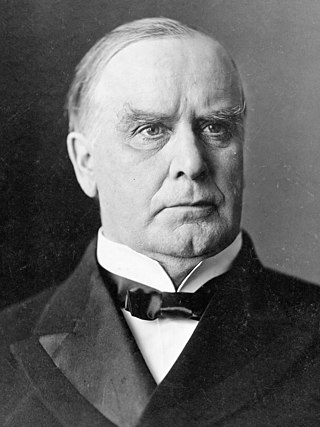
The 1900 United States presidential election was the 29th quadrennial presidential election, held on Tuesday, November 6, 1900. In a re-match of the 1896 race, incumbent Republican President William McKinley defeated his Democratic challenger, William Jennings Bryan. McKinley's victory made him the first president to win a consecutive re-election since Ulysses S. Grant accomplished the same feat in 1872. Until 1956, this would be the last time in which an incumbent Republican president would win re-election after serving a full term in office. This election saw the fifth rematch in presidential history, something that would also not occur again until 1956. This was also the first rematch to produce the same winner both times.

William Jennings Bryan was an American lawyer, orator, and politician. Beginning in 1896, he emerged as a dominant force in the Democratic Party, running three times as the party's nominee for President of the United States in the 1896, 1900, and 1908 elections. He served in the House of Representatives from 1891 to 1895 and as the Secretary of State under Woodrow Wilson from 1913 to 1915. Because of his faith in the wisdom of the common people, Bryan was often called "the Great Commoner", and because of his rhetorical power and early fame as the youngest presidential candidate, "the Boy Orator".

Nicholas Vachel Lindsay was an American poet. He is considered a founder of modern singing poetry, as he referred to it, in which verses are meant to be sung or chanted.

The People's Party, also known as the Populist Party or simply the Populists, was a left-wing agrarian populist political party in the United States in the late 19th century. The Populist Party emerged in the early 1890s as an important force in the Southern and Western United States, but collapsed after it nominated Democrat William Jennings Bryan in the 1896 United States presidential election. A rump faction of the party continued to operate into the first decade of the 20th century, but never matched the popularity of the party in the early 1890s.

Free silver was a major economic policy issue in the United States in the late 19th century. Its advocates were in favor of an expansionary monetary policy featuring the unlimited coinage of silver into money on-demand, as opposed to strict adherence to the more carefully fixed money supply implicit in the gold standard. Free silver became increasingly associated with populism, unions, and the perceived struggle of ordinary Americans against the bankers, monopolists, and robber barons of the Gilded Age. Hence, it became known as the "People's Money".
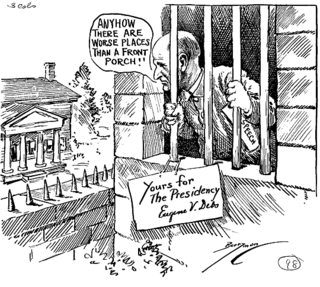
A front porch campaign is a low-key electoral campaign used in American politics in which the candidate remains close to or at home to make speeches to supporters who come to visit. The candidate largely does not travel around or otherwise actively campaign. The successful presidential campaigns of James A. Garfield in 1880, Benjamin Harrison in 1888, and William McKinley in 1896 are perhaps the best-known front porch campaigns.
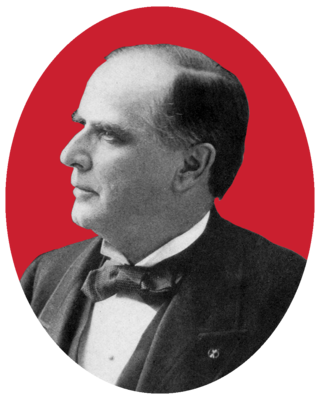
The 1896 Republican National Convention was held in a temporary structure south of the St. Louis City Hall in Saint Louis, Missouri, from June 16 to June 18, 1896.
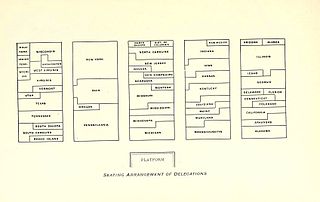
The 1896 Democratic National Convention, held at the Chicago Coliseum from July 7 to July 11, was the scene of William Jennings Bryan's nomination as the Democratic presidential candidate for the 1896 U.S. presidential election.

The Fourth Party System was the political party system in the United States from about 1896 to 1932 that was dominated by the Republican Party, except the 1912 split in which Democrats captured the White House and held it for eight years.

The presidency of William McKinley began on March 4, 1897, when William McKinley was inaugurated and ended September 14, 1901, upon his assassination. A longtime Republican, McKinley is best known for conducting the successful Spanish–American War (1898), freeing Cuba from Spain; taking ownership of the Republic of Hawaii; and purchasing the Philippines, Guam and Puerto Rico. It includes the 1897 Dingley Tariff which raised rates to protect manufacturers and factory workers from foreign competition, and the Gold Standard Act of 1900 that rejected free silver inflationary proposals. Rapid economic growth and a decline in labor conflict marked the presidency and he was easily reelected.

In 1896, William Jennings Bryan ran unsuccessfully for president of the United States. Bryan, a former Democratic congressman from Nebraska, gained his party's presidential nomination in July of that year after electrifying the Democratic National Convention with his Cross of Gold speech. He was defeated in the general election by the Republican candidate, former Ohio governor William McKinley.

The 1900 United States presidential election in New York took place on November 6, 1900. All contemporary 45 states were part of the 1900 United States presidential election. Voters chose 36 electors to the Electoral College, which selected the president and vice president.

The 1896 United States presidential election in New York took place on November 3, 1896. All contemporary 45 states were part of the 1896 United States presidential election. Voters chose 36 electors to the Electoral College, which selected the president and vice president.

The 1896 United States elections elected the 55th United States Congress. Republicans won control of the presidency and maintained control of both houses of Congress. The election marked the end of the Third Party System and the start of the Fourth Party System, as Republicans would generally dominate politics until the 1930 elections. Political scientists such as V.O. Key, Jr. argue that this election was a realigning election, while James Reichley argues against this idea on the basis that the Republican victory in this election merely continued the party's post-Civil War dominance. The election took place in the aftermath of the Panic of 1893, and featured a fierce debate between advocates of bimetallism and supporters of the gold standard.

In 1896, William McKinley was elected President of the United States. McKinley, a Republican and former Governor of Ohio, defeated the joint Democratic and Populist nominee, William Jennings Bryan, as well as minor-party candidates. McKinley's decisive victory in what is sometimes seen as a realigning election ended a period of close presidential contests, and ushered in an era of dominance for the Republican Party.

The 1900 United States presidential election took place after an economic recovery from the Panic of 1893 as well as after the Spanish–American War, with the economy, foreign policy, and imperialism being the main issues of the campaign. Ultimately, the incumbent U.S. President William McKinley ended up defeating the anti-imperialist William Jennings Bryan and thus won a second four-year term in office.

Mary Elizabeth Baird Bryan was an American attorney, writer, and suffragist. She was married to William Jennings Bryan.
